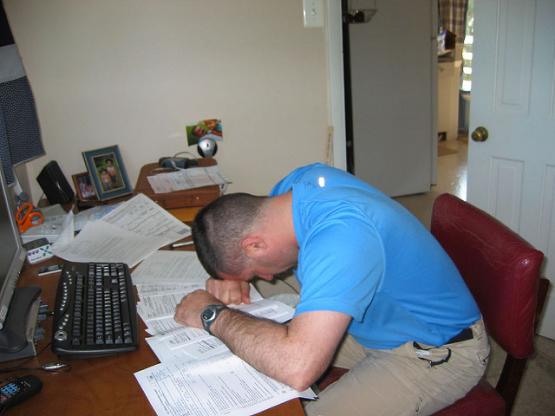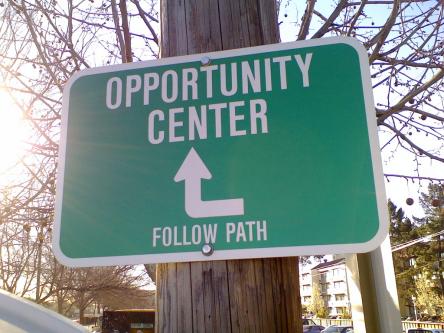Based on Henry George’s Social Problems and additional resources, this course is open to all interested adults. You’re welcome to sit in on the first session free, after which a $25 registration fee applies. Course meets Tuesdays, April 5 thru June 7. Course description is here. It is helpful if you pre-register.
In commemoration of “tax day,” the hypothetical due date for Federal and State personal income tax returns, we’ll discuss a sensible proposal by a man who understood the danger of an income tax: Henry George. In this free introductory session, we’ll review the problems George saw in his time, and discuss how they persist today. We’ll outline what he proposed to do about them, how his recommendations apply today, and provide an overview of the Progress & Poverty course.
The course continues on Friday afternoons thru May 20. Should you choose to enroll, there will be a $25 registration fee.

Do we need to suffer like this (and/or pay someone else) in order to fund government? In this presentation, HGS instructor Bob Jene looks at what it costs to collect income taxes. The direct cost to the government of operating the Internal Revenue Service is only a small part, as the burden put on the taxpayer, and the diversion of effort from productive uses, should also be considered.
Between 1948 and 1973, Americans’ real wages rose almost as fast as their productivity. After 1973, productivity grew 147% but wages rose only 19%. This raises two questions:
(1) If workers getting less, who is getting more?
(2) Is there a way to restore the balance?
To solve the problem of poverty, and the many other problems that follow from it, ordinary workers need higher wages. George Menninger describes how to raise wages without interfering in the free market and without taking anyone’s earnings.
George Menninger is an instructor at the Henry George School of Chicago, and attendees at this free program will have the opportunity to sign up for his Progress & Poverty course.
You can sign up for this free event thru Eventbrite, or RSVP directly by email.
If you want to understand the underlying causes of persistent poverty in America, you’ll benefit from this course. This is the “modern” version, based on Bob Drake’s “Abridged for Modern Readers” edit of Henry George’s original book. As always, the first class session is entirely free, but if you decide to enroll in the course we request a $25 fee to help cover costs. Veteran HGS instructor Bob Jene will help you understand not only the causes of economic stagnation, but a workable remedy.
This course will meet for six consecutive Friday’s beginning January 6. Our space at Overflow Coffee Bar is directly served by CTA routes 62 and 29, and a reasonable walk from Red, Green, and Orange Line Roosevelt station, as well as Metra Electric’s Museum Campus and 18th Street stops.
Between 1948 and 1973, Americans’ real wages rose almost as fast as their productivity. After 1973, productivity grew 147% but wages rose only 19%. This raises two questions:
(1) If workers getting less, who is getting more?
(2) Is there a way to restore the balance?
To solve the problem of poverty, and the many other problems that follow from it, ordinary workers need higher wages. George Menninger describes how to raise wages without interfering in the free market and without taking anyone’s earnings.
George Menninger is an instructor at the Henry George School of Chicago, and attendees at this free program will have the opportunity to sign up for his Progress & Poverty course.
No reservation is required, but you can let us know by email that you’re coming.
Between 1948 and 1973, Americans’ real wages rose almost as fast as their productivity. After 1973, productivity grew 147% but wages rose only 19%. This raises two questions:
(1) If workers getting less, who is getting more?
(2) Is there a way to restore the balance?
To solve the problem of poverty, and the many other problems that follow from it, ordinary workers need higher wages. George Menninger describes how to raise wages without interfering in the free market and without taking anyone’s earnings.
George Menninger is an instructor at the Henry George School of Chicago, and attendees at this free program will have the opportunity to sign up for his Progress & Poverty course.
No reservation is required, but you can let us know by email that you’re coming.

Urban sprawl is threatening to destroy much valuable farmland. We will look at data from one of the leading national organizations trying to mitigate this damage, The American Farmland Trust (AFT). Among other things they buy development rights from farmers to insure the land’s continued use in agriculture and attempt to facilitate community supported agriculture which makes family farms more viable. The Georgist fiscal reform reduces sprawl alleviating pressure on farmland.
(image credit: Kristian Bjornard ; Attribution-ShareAlike 2.0 Generic (CC BY-SA 2.0); https://flic.kr/p/8RYWFy)

Yes, it is possible to end poverty in America — or any independent nation — by recognizing a clear and logical distinction between private property and community property. Not just the poor, but everyone would have the opportunity to earn a decent living and enjoy better quality of life. Henry George, a prominent American philosopher and economist of the late 19th century, was the most prominent advocate of this reform. His book on the subject, Progress & Poverty, was probably the best-selling nonfiction work of his time, sparked a movement which brought prosperity to several American communities and foreign countries.
Introducing Progress & Poverty is a program by the Henry George School of Chicago, outlining the principles George advocated, how and why they work, and their potential for solving today’s problems in this city and elsewhere. This program will next be presented on Tuesday, October 10, 6PM to 8PM in the Chicago loop. Attendance is without charge or obligation. An extended course is also available for those interested.
We regret that due to management practices at the building, we must require pre-registration by email or phone (312 450-2906). If you are interested in the topic but this date and location don’t fit your schedule, please sign up for our announcement list. Also note that the program will be repeated in Edgewater on Sunday afternoon, October 29.

Yes, it is possible to end poverty in America — or any independent nation — by recognizing a clear and logical distinction between private property and community property. Not just the poor, but everyone would have the opportunity to earn a decent living and enjoy better quality of life. Henry George, a prominent American philosopher and economist of the late 19th century, was the most prominent advocate of this reform. His book on the subject, Progress & Poverty, was probably the best-selling nonfiction work of his time, sparked a movement which brought prosperity to several American communities and foreign countries.
Introducing Progress & Poverty is a program by the Henry George School of Chicago, outlining the principles George advocated, how and why they work, and their potential for solving today’s problems in this city and elsewhere. We’ll present this program on Sunday afternoon, October 29, 3PM to 5PM in the Edgewater neighborhood on Chicago’s north side. Attendance is without charge or obligation. An extended course is also available for those interested.
Pre-registration by email is encouraged, but not required if space is available. If you are interested in the topic but this date and location don’t fit your schedule, please sign up for our announcement list. Also note that the same program will be presented October 10 at a loop location.
